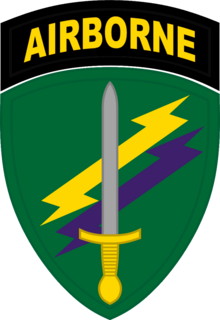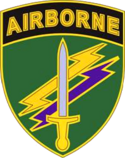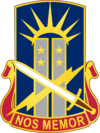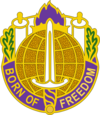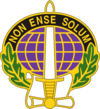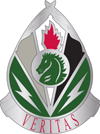
Psychological warfare (PSYWAR), or the basic aspects of modern psychological operations (PsyOp), have been known by many other names or terms, including Military Information Support Operations (MISO), Psy Ops, political warfare, "Hearts and Minds", and propaganda. The term is used "to denote any action which is practiced mainly by psychological methods with the aim of evoking a planned psychological reaction in other people".

The United States Army Special Operations Command (Airborne) (USASOC ( YOO-sə-sok)) is the command charged with overseeing the various special operations forces of the United States Army. Headquartered at Fort Liberty, North Carolina, it is the largest component of the United States Special Operations Command. It is an Army Service Component Command. Its mission is to organize, train, educate, man, equip, fund, administer, mobilize, deploy and sustain Army special operations forces to successfully conduct worldwide special operations.
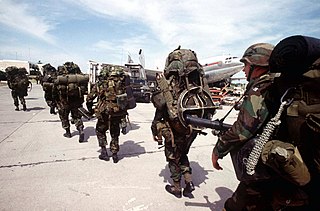
Operation Uphold Democracy was a military intervention designed to remove the military regime installed by the 1991 Haitian coup d'état that overthrew the elected President Jean-Bertrand Aristide. The operation was effectively authorized by the 31 July 1994 United Nations Security Council Resolution 940.

Fort Eisenhower, formerly known as Fort Gordon and Camp Gordon, is a United States Army installation established southwest of Augusta, Georgia in October 1941. It is the current home of the United States Army Signal Corps, United States Army Cyber Command, and the Cyber Center of Excellence. It was once the home of The Provost Marshal General School and Civil Affairs School.
Civil Affairs (CA) is a term used by both the United Nations and by military institutions, but for different purposes in each case.
A restricted line officer is a designator given to a United States Navy and Navy Reserve line officer who is not eligible for Command at Sea. There are many different types and communities, including Engineering Duty Officers, Aerospace Engineering Duty Officers, Aerospace Maintenance Duty Officers, Naval Intelligence Officers, Cryptologic Warfare Officers, Information Operations Officers, Foreign Area Officers, Public Affairs Officers, Naval Oceanographers, Information Professionals, and Human Resources.

Psychological operations (PSYOP) are operations to convey selected information and indicators to audiences to influence their motives and objective reasoning, and ultimately the behavior of governments, organizations, groups, and large foreign powers.
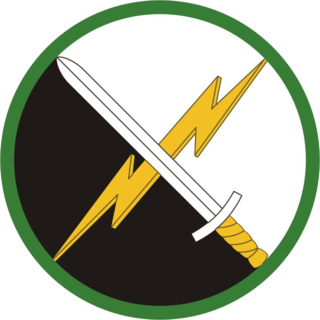
The 1st Information Operations Command (Land), formerly the Land Information Warfare Activity Information Dominance Center (LIWA/IDC), is an information operations unit under the operational control of U.S. Army Cyber Command (ARCYBER) and headquartered at Fort Belvoir, Virginia.

The 4th Psychological Operations Group (Airborne) (or 4th POG)(A) is one of the United States Army's active military information support operations units along with the 8th Psychological Operations Group (Airborne), which was activated 26 August 2011 at Fort Liberty. The 8th Group has responsibility for the 3rd and 9th Psychological Operations battalions while the 4th Group has responsibility for the 1st, 5th, 6th, 7th, and 8th battalions.

In the United States (US) military, a beret flash is a shield-shaped embroidered cloth that is typically 2.25 in (5.72 cm) tall and 1.875 in (4.76 cm) wide with a semi–circular base that is attached to a stiffener backing of a military beret. These flashes—a British English word for a colorful cloth patch attached to military headgear—are worn over the left eye with the excess cloth of the beret shaped, folded, and pulled over the right ear giving it a distinctive appearance.
United States Department of Defense, and associated, civil affairs are civil-military operations (CMO) use of military force to control areas seized from the enemy, minimize insurgency or civil interference with military operations, and maximize civil support for military operations. CMO is conducted in conjunction with combat operations during wartime and becomes a central part of a military campaign in counter-insurgencies. CMO operations have been in frequent use since 1775 by the United States Army, as well as more recently by the Navy and Marine Corps.
In United States military doctrine, unconventional warfare is one of the core activities of irregular warfare. Unconventional warfare is essentially support provided by the military to a foreign insurgency or resistance. The legal definition of UW is:
Unconventional Warfare consists of activities conducted to enable a resistance movement or insurgency to coerce, disrupt or overthrow an occupying power or government by operating through or with an underground, auxiliary or guerrilla force in a denied area.
According to JP 1-02, United States Department of Defense Dictionary of Military and Associated Terms, a military journalist is "A U.S. Service member or Department of Defense civilian employee providing photographic, print, radio, or television command information for military internal audiences. See also command information. "
Information Operations is a category of direct and indirect support operations for the United States Military. By definition in Joint Publication 3-13, "IO are described as the integrated employment of electronic warfare (EW), computer network operations (CNO), psychological operations (PSYOP), military deception (MILDEC), and operations security (OPSEC), in concert with specified supporting and related capabilities, to Information Operations (IO) are actions taken to affect adversary information and information systems while defending one's own information and information systems.
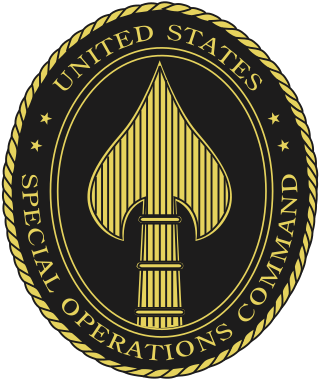
The United States Special Operations Command is the unified combatant command charged with overseeing the various special operations component commands of the Army, Marine Corps, Navy, and Air Force of the United States Armed Forces. The command is part of the Department of Defense and is the only unified combatant command created by an Act of Congress. USSOCOM is headquartered at MacDill Air Force Base in Tampa, Florida.
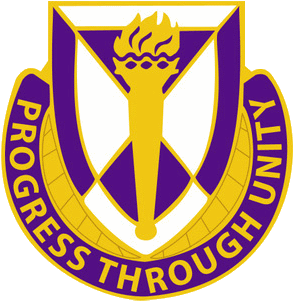
The 490th Civil Affairs Battalion is a civil affairs (CA) unit of the United States Army Reserve located at the Grand Prairie Armed Forces Reserve Complex in Grand Prairie, Texas and organized under the 321st Civil Affairs Brigade, 350th Civil Affairs Command, United States Army Civil Affairs and Psychological Operations Command (Airborne) or USACAPOC. The 490th is composed of Headquarters and Headquarters Company (HHC) and its four tactical companies, Alpha, Bravo, Charlie, and Delta. The unit was activated for service during World War II, the Berlin Crisis, and Operation Iraqi Freedom (OIF).

The 151st Theater Information Operations Group, or 151st TIOG, is an Information Operations formation of the United States Army Reserve, headquartered at Fort Totten, New York. Founded in 2009, the 151st TIOG is the only Theater Information Operations Group in the U.S. Army Reserve. It is composed mostly of Army Reserve Soldiers in two battalions based out of Parks Reserve Forces Training Area, Fort George G. Meade, and Fort Totten. The current commander is Colonel Jonathan Steinbach, who assumed command in July 2023.

The 353rd Civil Affairs Command organizes, trains, and equips assigned Civil Affairs forces to mobilize, deploy, and conduct civil military operations. On order, the 353rd Civil Affairs Command organizes, trains, and equips assigned Civil Affairs forces to mobilize, deploy, conduct civil military operations, and redeploy in order to support Geographic Combatant Commander mission requirements with focus on the US Africa and US European Command areas of responsibility.
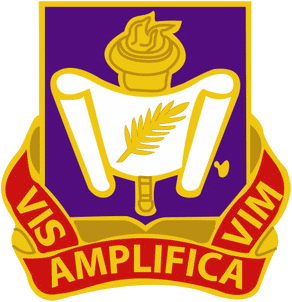
The 489th Civil Affairs Battalion is a civil affairs (CA) unit of the United States Army Reserve (USAR) located at the US Army Reserve Center in Knoxville, Tennessee, part of the 354th Civil Affairs Brigade, 352nd Civil Affairs Command. In turn the 354th CA Brigade is part of United States Army Civil Affairs and Psychological Operations Command (USACAPOC). The 489th is composed of Headquarters and Headquarters Company (HHC) and its four tactical companies, Alpha, Bravo, Charlie, and Delta. The unit was activated for service during World War II, Bosnia, Operation Enduring Freedom (OEF), and the Iraq War.
